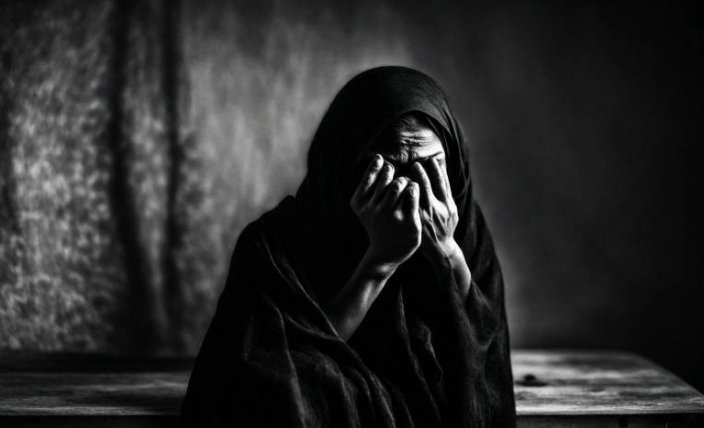
The Network of Women Journalists for Digital Rights (NWDJR) is not only deeply concerned but fiercely angered at yet another instance of brutal domestic violence by the male members of the journalist community. This time, the alleged perpetrator is an influential media person, an ARY anchor named Ashfaque Ishaq Satti.
Enough is enough; we are appalled at the criminal justice systems and institutions permeated with patriarchy that condone violence against women, dismissing it as a mere “personal or private dispute.” Domestic violence is criminalised in Pakistan under the Domestic Violence (Protection and Prevention) Act 2020. Additionally, the dignity of an individual is a fundamental right protected in the Constitution of Pakistan, and dismissing it as “a personal” matter is incongruous when the law specifically safeguards it as a human right. Domestic violence is the result of deep-rooted political structures and power dynamics that are intrinsically oppressive and patriarchal. We strongly believe that the personal is political, and for women, the challenges they face in their personal lives–the double shift due to inequitable distribution of care and domestic work, violence within the home, harassment in work and public places, online abuse directed at them–impacts and often puts their lives in danger.
We have not forgotten the murder of Shaheena Shaheen at the hands of her husband, another perpetrator from the media fraternity. NWJDR has also received individual testimonies from its members of women journalists who are facing severe domestic abuse and violence from their partners who are also part of the media industry, and holding influential positions. Through the countless testimonies we have received, we foresee a new and dangerous trend of male journalists perpetrating violence in their relationships, highlighting a bleak picture that needs urgent action.
As reported by the Human Rights Commission of Pakistan (HRCP) in 2020, over 90% of Pakistani women have faced domestic violence in their lifetime. According to a media report in Express Tribune in 2022, “data released under the Punjab Transparency and Right to Information Act 2013, cases of domestic violence saw an increase in the last five years. Same is the situation in courts; an estimated forty percent of cases in courts are family cases, and the remaining sixty percent involve crimes like murder, kidnapping and theft. For example, if a court has 150 total cases for hearing, at least eighty-five cases are family cases, mainly of violence”. How many more women will have to become victims of domestic abuse for it to be taken seriously?
Domestic violence is often an underreported crime due to the stigma surrounding it and because of the lack of accessibility to complaint mechanisms for victims. Women are not believed; even when they provide evidence of abuse there is a hue and cry on how there are “two sides” to the story. How men use influence in cases of domestic violence to evade accountability and impunity is not uncommon. Law enforcement agencies, including the police, also force the survivors of abuse to reach a settlement outside the court, again reiterating how a “private” matter should remain within the confines of the house and associating ‘family honor’ with a woman’s dignity and identity.
The concerns that women face should be taken seriously and acted upon, and in cases where male journalists are involved, media outlets as well as the government must respond immediately to ensure that influence is not exercised to evade legal action. State inaction sends a message to women that they are on their own and in the long term discourages them from speaking up against abuse and filing a complaint. The challenges that women face before they actually speak up are already humongous; from living in close proximity with the perpetrators who are constantly surveilling their physical movement and devices to going back to the same house after registering a complaint can cost women their lives.
Additionally NWJDR acknowledges and appreciates the step taken by ARY Management to immediately suspend Ashfaq Satti till the law takes its course and decides the matter. It is a promising step on how our society should have zero tolerance for violence against women. However, a lot more needs to be done before to prevent the menace of domestic violence in our country.
We, the undersigned, demand the following:
- We call upon media outlets to thoroughly investigate allegations against their personnel and take prompt and decisive action against individuals found guilty of domestic violence. Media organizations must not shield perpetrators and should instead prioritize the safety and well-being of women who are subjected to human rights abuses.
- We urge law enforcement agencies, especially the police, to handle cases of domestic violence with the seriousness they deserve. Survivor complaints should be thoroughly and impartially investigated, and survivors should not be coerced into settling outside the court. The police should actively pursue legal action against perpetrators, ensuring that the law is applied without influence or bias.
- We call upon the National Commission of Human Rights (NCHR) to proactively intervene in cases of domestic violence, particularly those involving perpetrators from the media industry. This includes conducting independent investigations into reported incidents, ensuring the protection of survivors, and holding perpetrators accountable under the law.
- We urge press clubs and journalist unions to actively condemn such grave incidents and avoid using their influence to silence or pressure women survivors of domestic violence to save male members of the media fraternity. These organizations must prioritize the safety and well-being of their members over protecting individuals accused of such heinous acts.
- Domestic abuse leaves a lasting impact on mental health and well being of the victim. The government must provide free psychological assistance to the victims.
- Healthcare in Pakistan is not easy and free to obtain especially when a case has been registered with the police. The government must ensure setting up sections in hospitals where victims are provided with free medical treatment.








